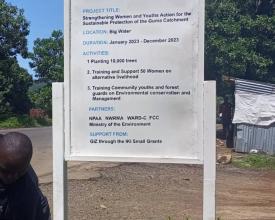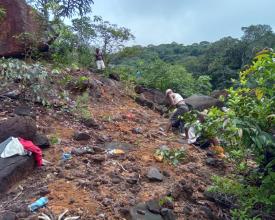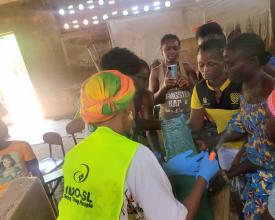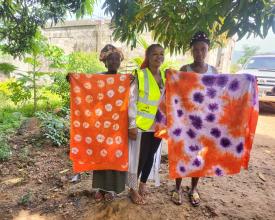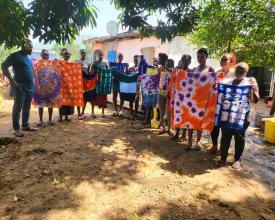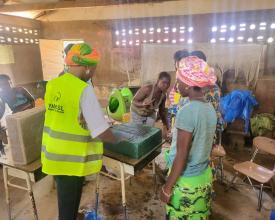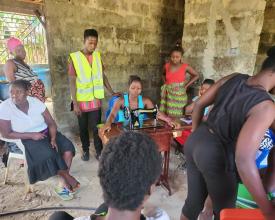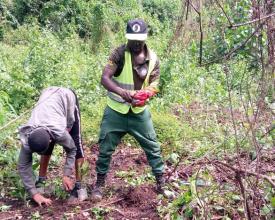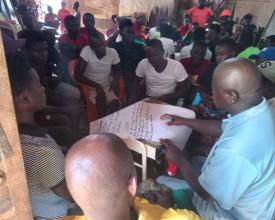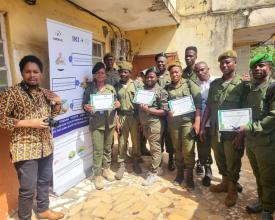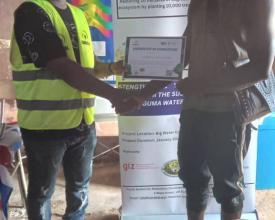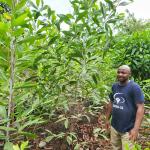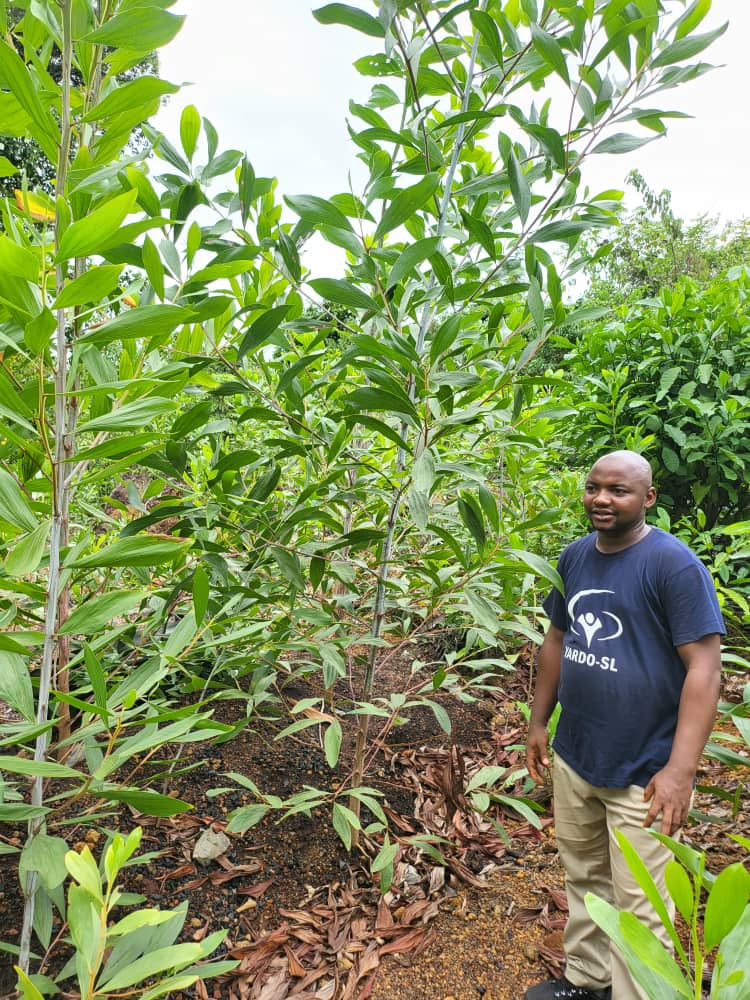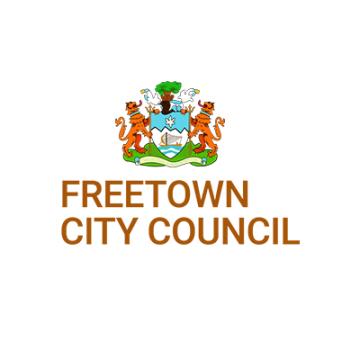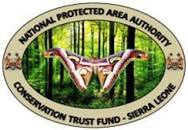
Renforcement de l'action des jeunes et des femmes pour la protection durable du bassin hydrographique de Guma
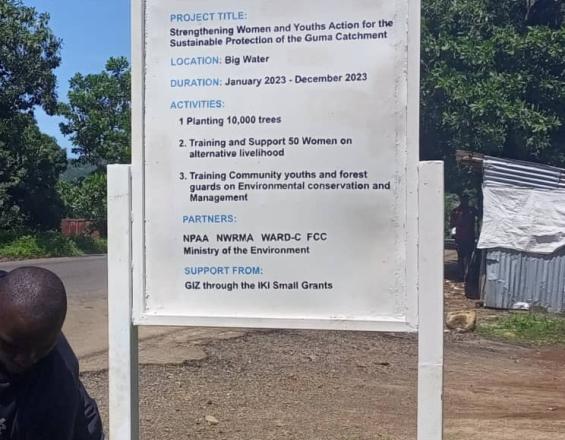
La forêt du parc national de la région occidentale abrite une riche biodiversité et constitue une bonne source de services écosystémiques. Elle abrite le barrage de Guma, seule source d'eau courante pour la ville voisine de Freetown, qui compte 2 millions d'habitants.
Malgré ses avantages écologiques et socio-économiques, la forêt est confrontée à une déforestation rampante associée à une mauvaise planification urbaine, mais surtout à des activités économiques telles que la production de charbon de bois, l'abattage de bois, la collecte de bois de chauffage, etc.
Le projet vise donc à relever ces défis par les moyens suivants
1. Sensibiliser la communauté en formant les jeunes de la communauté à la gestion de l'environnement
2. en renforçant le travail des gardes forestiers par le biais du développement des capacités
3. la plantation de 10 000 arbres pour restaurer les zones dégradées de la forêt
4. la formation et le soutien de 50 femmes sur les moyens de subsistance alternatifs.
Contexte
Défis à relever
Aucun défi n'a été signalé jusqu'à présent
Emplacement
Traiter
Résumé du processus
Les blocs sont complémentaires les uns des autres pour atteindre l'objectif global du projet, à savoir la protection du bassin hydrographique de Guma.
Par exemple, la formation des jeunes et des gardes forestiers à la gestion de l'environnement contribuera à la sensibilisation et à la mobilisation en faveur de la restauration des zones dégradées de la forêt. Par ailleurs, la formation et le soutien des femmes à des moyens de subsistance alternatifs créeront des emplois décents pour les femmes et réduiront le fardeau économique sur la forêt, réduisant ainsi considérablement la déforestation.
Blocs de construction
Donner aux femmes des compétences pour protéger la forêt
Il est donc important de prendre en compte les femmes dans l'élaboration de mécanismes efficaces d'action communautaire pour la protection des forêts. Les femmes sont la source de revenus de leurs familles et elles dépendent de la forêt pour leurs activités économiques, même si elles sont nuisibles.
Former les femmes et les aider à acquérir d'autres compétences leur permettant de gagner leur vie ne contribuera pas seulement à protéger la forêt, mais aussi à stimuler l'économie locale et à réduire les inégalités, tout en fournissant des emplois propres et décents.
Comment cela fonctionne-t-il ?
1. Tout d'abord, comprendre le contexte local en termes d'environnement socio-économique (situation professionnelle actuelle, statut économique, âge, nombre de personnes à charge, etc.)
2. Il est également utile de concevoir des compétences de subsistance qui répondent à une forte demande du marché, tout en étant faciles à apprendre et à adapter.
3. En outre, il est bon d'aider à catégoriser les femmes, en fonction de leur choix et de leurs antécédents, dans les différents programmes de formation professionnelle, par exemple, la couture doit avoir des personnes qui savent écrire, alors que la production de légumes n'en a pas besoin. La teinture de cravates en gara, la fabrication de savon, etc. peuvent intéresser un public plus jeune.
4. Enfin, il faut veiller à ce que la formation soit dispensée de manière efficace afin de favoriser la participation de tous. Cela peut se faire en dispensant la formation à des horaires qui conviennent à la plupart, en utilisant la langue locale, en donnant la priorité aux séances pratiques, en suivant et en notant les stagiaires, etc.
Facteurs favorables
1. Collaborations communautaires
Les acteurs communautaires ont un rôle majeur à jouer dans l'identification des femmes bénéficiaires (celles dont les activités économiques détruisent la forêt) et dans leur inscription à la formation. Les parties prenantes doivent aider à obtenir la coopération des bénéficiaires pour atteindre les résultats escomptés.
2. Formation
La magie consiste à concevoir un manuel de formation adapté aux besoins et au contexte de la communauté et des bénéficiaires. Il faut de bons animateurs capables de motiver les bénéficiaires et de les inciter à obtenir des résultats.
Leçon apprise
1. Les bénéficiaires participeront presque à 100 % si le calendrier de la formation n'affecte pas leur travail ou d'autres engagements. Ils participeront également s'ils se sentent à l'aise avec l'approche de la formation et le formateur.
Ressources
Restauration d'un écosystème dégradé (bassin versant)
Les activités économiques telles que la collecte de bois de chauffage, la production de charbon de bois, etc. ont été une source majeure de subsistance pour les résidents des communautés bordées de forêts, même si cela signifie la destruction de leur environnement et son impact négatif sur leur vie.
Cette déforestation incontrôlée a des conséquences néfastes sur la perte du couvert végétal, qui se traduit par une diminution de la biodiversité, une augmentation du ruissellement et une faible capacité de rétention de l'eau dans les bassins hydrographiques.
Il est donc important de travailler avec les communautés pour identifier ces zones dégradées et élaborer des stratégies de restauration.
Comment ?
1. Tout d'abord, inclure la communauté dans l'identification des zones dégradées et cartographier les zones pour déterminer les hectares et le nombre d'arbres à planter.
2. Travailler avec les parties prenantes, telles que l'Autorité nationale des zones protégées, pour évaluer et déterminer les types d'arbres à planter et pour promouvoir la durabilité du projet.
3. Impliquer les communautés dans la plantation, afin qu'elles s'approprient davantage le projet.
4. Mettre en place des mécanismes financiers pour récompenser la plantation d'arbres.
Facteurs favorables
Participation de la communauté
L'exploitation des connaissances locales peut contribuer à accélérer les processus des activités du projet.
Engagement des parties prenantes
Les organismes de réglementation peuvent guider techniquement les processus de plantation d'arbres et veiller au respect de la protection des arbres plantés.
Expertise
La compréhension du contexte local et du fonctionnement de l'écosystème est essentielle pour la restauration. La cartographie SIG est un outil important pour cartographier les zones dégradées à l'aide d'images satellite.
Leçon apprise
Les communautés ont une connaissance approfondie des arbres de la forêt voisine. Elles peuvent être très utiles dans les activités de restauration
La cartographie SIG est essentielle pour l'identification des sites de plantation (cartographie des zones dégradées à l'aide d'images satellite).
Les récompenses/paiements pour la culture d'arbres peuvent contribuer à renforcer les moyens de subsistance, à créer des emplois verts et à promouvoir l'appropriation du projet par la communauté.
Éducation à la sensibilisation à l'environnement
En raison du faible taux d'alphabétisation dans les communautés bordées de forêts, les habitants ne comprennent généralement pas l'interaction entre la nature et l'homme, ni comment leurs actions peuvent affecter l'environnement et ses conséquences sur leur vie et leurs moyens de subsistance.
Il est donc essentiel de sensibiliser la communauté (en particulier les jeunes) à la conservation des forêts et à la gestion de l'environnement.
Une fois instruits sur le sujet, ils serviront d'ambassadeurs en aidant à éduquer d'autres membres de la communauté par le biais d'activités de plaidoyer et de sensibilisation.
Comment cela fonctionne-t-il ?
1. Identifier et enregistrer les jeunes de la communauté (si possible, inclure également les gardes forestiers) en tant que bénéficiaires de la formation.
2. Organiser efficacement la formation et évaluer les résultats de l'apprentissage
3. Demander aux stagiaires comment ils utiliseront les nouvelles connaissances.
4. Les aider à élaborer leur plan d'action communautaire
Facteurs favorables
Participation de la communauté
communiquer avec la communauté sur les impacts de la formation afin de s'assurer de sa volonté de participer à la formation
Collaboration des parties prenantes
impliquer les autorités gouvernementales dans la conception du manuel de formation afin de s'assurer que son contenu est conforme aux normes acceptées au niveau national.
Formation dispensée
Une formation simple et facile à lire, bien illustrée, doit être dispensée par un animateur dynamique utilisant la langue locale pour expliquer
Leçon apprise
La formation des jeunes à l'environnement a permis d'accroître le taux de sensibilisation et de modifier les comportements, ce qui a conduit à la promotion d'une gestion communautaire de l'environnement.
Impacts
50 jeunes sont formés pour former un corps de jeunes écologistes
20 gardes forestiers formés et soutenus dans la conservation des forêts
10 000 arbres plantés pour restaurer environ 10 ha d'écosystèmes dégradés (bassins versants)
50 femmes formées et aidées à acquérir d'autres compétences pour gagner leur vie
Bénéficiaires
Bénéficiaires directs : 120
i. jeunes formés = 50
ii. compétences des femmes en matière de moyens de subsistance = 50
iii. formation de gardes forestiers = 20
Bénéficiaires indirects = +2 000
les résidents bénéficient d'une réduction de l'érosion et du stress thermique grâce aux arbres plantés
Objectifs de développement durable
Histoire
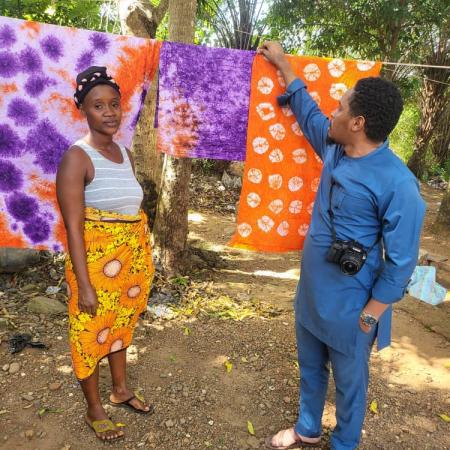
J'ai obtenu mon diplôme en 2021 et je suis revenu à Big Water. Il ne s'est rien passé pour moi, comme pour beaucoup d'autres diplômés, car les taux de chômage sont plus élevés de nos jours. J'ai beaucoup de mal à m'occuper de moi, de ma mère et de mon fils. C'est pourquoi, lorsque j'ai entendu parler de cette formidable opportunité de formation professionnelle offerte par YARDO grâce au soutien d'IKI Small Grants, je l'ai saisie avec l'envie d'apprendre.
À l'issue de ma formation, je fabrique maintenant mes teintures de gara et je les vends aux touristes sur la plage. J'espère que mon entreprise se développera au fil du temps et que je deviendrai indépendante. Mais je dois dire que j'ai maintenant du travail tous les jours et que je suis en mesure de nourrir ma famille et de payer les frais de scolarité de mon enfant.
Ce qui est le plus étonnant dans ce projet, c'est la façon dont il a intégré le renforcement des moyens de subsistance et des pratiques de restauration. Désormais, moi et beaucoup d'autres femmes ne ferons plus de petits travaux qui nuisent à la forêt et à notre bien-être. Plus de production de charbon de bois, plus d'exploitation de carrières.
-Sarah Kamara
Bénéficiaire,
Formation aux moyens de subsistance
Voir la vidéo complète de son test d'impact ici :

